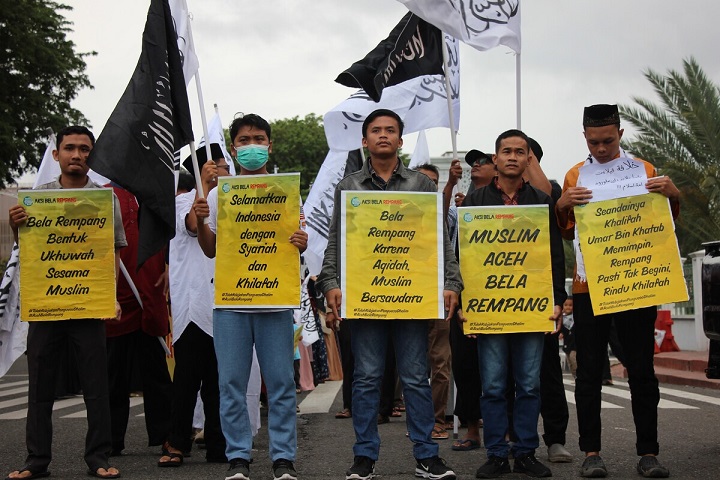At the beginning of September, two extraordinary events occurred almost simultaneously in Indonesia. The first is the series of the 43rd ASEAN Summit which was held in Jakarta on 5-7 September with the theme ASEAN as the epicentrum of growth. Second, at the same time clashes broke out in Rempang – Batam which occurred on September 7 – 2023, between joint forces who were going to vacate land for the Rempang Eco City area and residents who were defending the land which had been occupied for generations since 1834.
Children and women inevitably became victims, water canon shooting tear gas near SDN 24 and SMPN 22 Galang schools, causing panic, fear and even physical injuries to children who were learning. According to KontraS, at least 20 residents suffered serious or minor injuries as a result of the riots, including children, women and the elderly. The joint police and military forces were assessed as having used “excessive force” and “recklessly” fired tear gas.
Comment:
These two events are like heaven and earth; The ASEAN Summit is an exclusive and elitist high-level meeting while the Rempang conflict is a tragedy on the ground where the common people are always becoming the victims.
Interestingly, these two events not only coincide in terms of time, but there is another common thread, namely the large flow of foreign investment-based infrastructure initiatives. Rempang Eco City (REC) is one of the National Strategic Projects (PSN) with investment from China which has the consequence of having to relocate 5,000-10,000 residents to Galang Island. This project is in line with the current development that is being accelerated in Southeast Asian countries. This is clearly in the same corridor as the 2023 ASEAN Summit which takes the theme of ASEAN as the Epicentrum of Growth. That’s why there is pressure for supply chain development to be strengthened and infrastructure to be boosted, ironically all of these initiatives are carried out by “begging” for foreign investment.
As a result, these projects are like white elephant projects, where it being built magnificent, even though its existence has high costs, minimal social benefits, and even becomes a long-term economic and ecological burden. This metaphor is taken from Thai culture during the Siamese Kingdom, white elephants of low quality would be given as gifts to friends and allies of the king of Siam. These animals require a lot of care, and because they are sacred, they cannot be made to work, which makes white elephants a financial burden and a huge inconvenience for the gift recipient or owner.
The 2023 ASEAN Summit is one of the forums that is rolling out the red carpet to these “white elephant” projects. Indonesian President even happy to reveal that the results of this summit were a total of 93 projects worth USD 38.2 billion or IDR 2,118 trillion originating from 93 projects. These projects may be grandiose, but they often prove to be miserable for the people. Based on records from the Agrarian Reform Consortium (KPA), in 2022 there were 32 eruptions of agrarian conflict, 11 of which were related to PSN (National Strategic Projects). The area of the conflict reached 102 thousand hectares and affected 28 thousand families.
The ASEAN Summit may be able to promise an epicentrum of growth in the region, but it has also been clearly proven to ignore “the epicentrum of the problem”, namely the welfare and survival of the common. The big question then is: “Why did the ASEAN leaders welcome China with a magnificent Gala Dinner, while facing their own people with water cannons, tear gas and dozens of companies of armed troops?”
If we want to be honest, another important, more fundamental aspect from this case is the secularization aspect. These development projects completely ignore Islamic teachings. In fact, capitalistic development was the lifeblood of economic and cultural colonization in Muslim lands, as it has no mission on welfaring people and this had to be paid dearly by the Ummah. The people are the main and first victims.
Islam prohibits development based on foreign investment, especially those involving usurious debt. Development in Islam aims to worship Allah, is based on Islamic ideology and prioritizes human development above spatial and physical development. Development actors guide the process of value circulation in accordance with Islamic creeds and the capital circulation in equal manner based on Islamic Sharia. From this principle, humans must be the center of development, NOT material nor economic growth. Because when the development moves along the axis of materials and objects instead, humans become the least valuable element, both within society itself and outside it.
Thus, the greed for wealth and ambition for material splendor is actually a destruction, not development. From K’ab bin Malik (May Allah be pleased with him) reported, Messenger of Allah (saw) said:
«مَا ذِئْبَانِ جَائِعَانِ أُرْسِلاَ فِى غَنَمٍ بِأَفْسَدَ لَهَا مِنْ حِرْصِ الْمَرْءِ عَلَى الْمَالِ وَالشَّرَفِ لِدِينِهِ»
“Two hungry wolves sent in the midst of a flock of sheep are no more destructive to them than a man’s greed for wealth and fame is to his Deen.”
[At- Tirmidhi, who classified it as Hadith Hasan Sahih].
Dr. Fika Komara
Member of the Central Media Office of Hizb ut Tahrir

